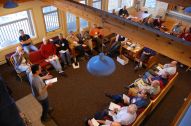This last weekend 29 men from Minneapolis’ Westminster Presbyterian Church gathered for a retreat.



The setting was the Presbyterian Clearwater Forest Camp and Retreat Center, which is 120 miles north of Minneapolis near Deerwood, Minnesota. In a beautiful 1,106 acres overlooking Clearwater Lake, the Center’s mission is to provide faith-building Christian programming, to provide effective facilities and services to support conferencing, to nurture active Christian community and to be the faithful steward of God’s creation at Clearwater Forest.

The program on Saturday was lead by Matt Skinner, a Westminster member and Associate Professor of New Testament at Luther Seminary of St. Paul, Minnesota. He invited small group discussion about different images of community in the following passages of the New Testament: first session (Acts 2: 42-47; Acts 4: 32-37; Romans 14: 1-23); second session (Galatians 4: 1-7; Philemon); and third session (1 Corinthians 12: 12- 31; and John 15:1-11).
The passages from Acts were most meaningful for me. They discuss the community life in Jerusalem of the Jews who believed that Jesus was their Messiah. After spending much time together in the temple, they gathered together in their homes breaking bread and eating “with glad and generous’ hearts.” They also sold their possessions and distributed the proceeds to those in need.
Initially these passages said to me that this community of the first Christians was a distinct minority and needed one another’s company and support, spiritually and materially. The passages also suggest that this was a financially diverse group, thus creating a need for financial support of the poorer ones by the more affluent ones.
I also was reminded by the Acts verses of our brothers and sisters at our partner Presbyterian-Reformed congregation in Matanzas, Cuba. They are survivors of a former period of persecution and share their limited possessions with one another. On one of my trips their pastor told us that when he was unable to buy any toilet paper for our visit, he asked the members of the congregation to share whatever “TP” they had. We also bring over-the-counter medications from the U.S. to give to our partner church, which then acts as a de facto dispensary for its members and others in the neighborhood. Although our partner has its own church building that was constructed before the Revolution of 1959, newer Christian communities that do not have the money for church buildings meet in homes and are known as “house churches.”
These passages also remind me of the various utopian communities that have existed in the U.S. They shared their material resources often for religious reasons. At their best, they exhibit the same virtues of the early Christian communities discussed in Acts, but they have not been able to sustain themselves as long-term communities. At their worst, they are organizations for the self-aggrandisement of the founders of cults.
The above reactions saw the verses as relating to other times and places. On further reflection, however, I see the passages from Acts speaking to Westminster and other contemporary U.S. churches Our churches provide space and times for people of faith to gather together to renew their faith and lives and to seek forgiveness for their many failures, both individual and corporate. Moreover, just by being together in worship helps remind us all that we are not in this endeavor alone as we combat the dominant cultural emphases on materialism and secularism. Yes, we too are a minority and need support and encouragement from one another. Although we do not own all of our possessions in common today, we do respond to various calls for financial support of those in need.
Finally the retreat itself was the intentional creation of a short-term community of men. Many of us car-pooled to extend our time together on the two-hour rides to and from the Center. In our meals and times of general conversation we got to know one another at a deeper level than is usually possible when we pass one another on a Sunday in a congregation of 3,000. For example, several years ago at another men’s retreat, I became acquainted with someone for the first time and thereafter we developed a friendship.
Duane. Thank you so much for posting these excellent comments on the men’s retreat. The scriptures we studied are so relevant in this time. I am currently reading John Phillip Newell”s book titled THE REBIRTHING OF GOD. In the book Newell refers to the gospel of Mark Chapter 4 verse 11 where Jesus talks about the “Mystery of the Kingdom of God”. I have been continually perplexed by this so called “Mystery” Now I believe I have been so enlightened about this after our discussions. As in the gospels Jesus attempts to explain the mystery by teaching in numerous parables. To the disciples the mystery is given, but to the multitudes it is complicated by intrenched traditions, laws, resistance to change, and political forces. These attitudes are most common in todays world. It is my conclusion that the “Mystery of the Kingdom of God” is in fact the coming together in community of all peoples in one mind, heart, and spirit to be fulfilled in totality through Jesus Christ.